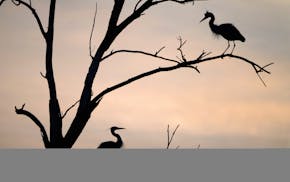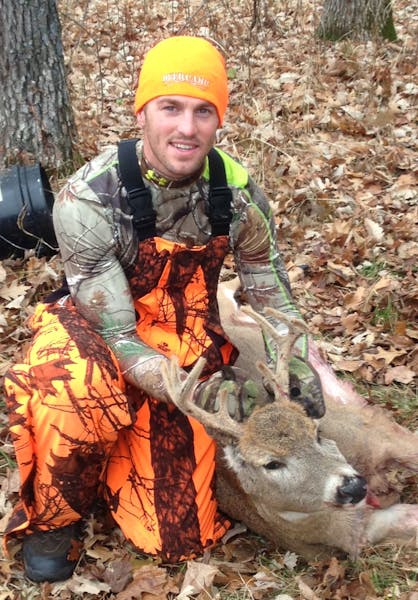As you read this, I'll be sitting in a deer stand in Wisconsin, hoping for the best. Either that, or the best already will have happened, and I'll have a deer down. Regardless, my 18-year-old son, Cole, will be nearby, hunting with me out of a shack not far from Cumberland, Wis.
That Cole is now a high school senior seems a bigger deal to me than when his older brother, Trevor, now 20 and away at college, was the same age.
With Trevor's expected departure, I knew I still had Cole to hunt and fish with for a few years. Now I'm on the cusp of going afield more often without them — an uneasy prospect.
Over the boys' lifetimes, I've given quite a bit of thought to the worth of exposing them to outdoor pursuits, and how best to do it, assuming they had an interest.
The issue — nationally, at least, though less so in Minnesota — of declining hunting and fishing participation among young people is among primary threats facing North American conservation.
A continued falloff in young people who go afield not only undercuts hunting and fishing but fish and wildlife themselves. In the United States, hunters and anglers traditionally have paid the brunt of their management, and the acquisition of their habitats, through license fees.
So, today, I offer some thoughts on exposing kids to outdoor pursuits, based on my experiences.
I do so recognizing that we're all different, with varying interests in various activities. Some kids wouldn't hunt or fish if you paid them. Which is fine.
Additionally, there is no intention here to place outdoors interests above, say, leanings toward the arts, excellence in the classroom or distinction on a playing field. Each has value.
That said, the appeal and rewards of outdoors activities are broad, if not universal, whether it's hunting and fishing, paddling, hiking, biking, riding, climbing — all of it. Challenge is one reason, as is self-actualization and the prospect of personal accomplishment.
Importantly, introducing kids to the outdoors might also blunt the effects of today's popular culture. Which would be a good thing.
Many parents fear raising children in a society dominated by electronic toys and gadgets, easy access to drugs, and TV shows that not too many years ago would have passed for soft porn.
In this environment, it can be valuable and rewarding to expose a kid to walleye fishing or canoe paddling or whitetail hunting — or all of it.
Based on my experiences, then, here are suggestions about how to introduce kids to the outdoors and to help them grow in related pursuits.
Parents
First lesson: Outdoor activities aren't variations on soccer practice, where Mom or Dad drops off little Barbie or Ken and heads to the mall or grocery store. Parents instead have to go fishing (as one example) with the child, not send her or him alone or with someone else.
Unfamiliar with shore fishing (for example) in the Twin Cities? Then acquaint yourself with the sport simultaneously with your son or daughter. And if you're an expert, learn anew about the activities through your children's experiences — and be there to answer the many questions that will arise.
Try to arrange these earliest trips so kids have a good chance to catch fish or otherwise succeed.
Also, beware the weather. Freezing a youngster on a deer stand his or her first time in the woods isn't a good idea.
Tips: Make a schedule and keep it, and talk up outings in advance. This builds anticipation and excitement, and allows kids to participate in the planning and equipment preparation. Also, proceed at your child's pace. And mix in fun stuff. Stop at Dairy Queen. Stay overnight at a motel with a water slide. As much as possible, make every trip memorable.
Relatives
Grandparents. Aunts. Uncles. Cousins. These and other relatives usually are the first touchstones parents leverage to expand and further their kids' outdoors interests.
My brother-in-law, for instance, Rick Netko of Crosslake, initially exposed Trevor and Cole to muskie fishing. Not by requiring that they throw big plugs all day in hopes that they'd catch a monster. Instead, he took them trolling in the evening on a favorite lake, and they regularly caught muskies just at sunset.
Similarly, my brother, Dick, and his son, Brian, have welcomed our boys on deer hunts and walleye trips from the time they were very young. This gives kids a chance to learn from people other than their parents, while also (hopefully) exposing them to still more examples of proper field behavior. The latter can include everything from rifle and shotgun muzzle control to safe deer-stand use and respectful behavior in a hunting shack.
Groups
Scouts and certain other youth groups nurture outdoors interests in an organized setting and can be extremely valuable.
Signing kids up with the youth versions of Ducks Unlimited (www.ducks.org), Pheasants Forever (www.pheasantsforever.org) and similar groups also helps, as does attending their banquets, which usually is the first step in exposing kids to the idea of conservation volunteerism and fundraising.
Additionally, having outdoors and/or adventure magazines lying around the house expands kids' horizons and notions of what's possible.
Friends
Over many years, I've learned from better dog trainers than I am, also better wingshots, archers, naturalists and conservationists. In some cases, Trevor and Cole have learned from the same people.
A few examples: Dave Zentner of Duluth is expert in many hunting and fishing pursuits, but perhaps none more so than steelheading. He's taught the boys more about North Shore steelheading than I ever could, and has been happy to do it. Similarly, the boys are as comfortable with my bird-hunting and fishing friends Will Smith, Denny Lien and Bill Marchel as they are with their own friends, the result of passing so many pheasant and duck openers with them.
And the shack Cole and I are staying in this weekend? It belongs to my friend Norb Berg — the same fellow who has welcomed the boys to his deer-hunting land since they first could walk — and who years ago passed on this bit of wisdom to a very young Trevor when he was a bit full of himself after shooting a buck: "Say little when you lose. And less when you win.''
Another thought: Looking around, who among your friends do you want to emulate in the way you raise your kids, relative to the outdoors?
Dave, Will, Denny and Norb certainly would be among my picks, as would others, including Dick Hanousek of St. Paul. Every holiday season for years, Dick's family Christmas card showed him, his wife, Kathy, and all of their kids somewhere in a river, holding fishing rods. Seeing the card the first time, I recall thinking how festively it spoke to the importance of shared family interests that can continue through generations.
Experts
As needed, parents should encourage skill growth by providing expert instruction. The subject might be archery, trapshooting, dog training — whatever.
Our kids always will be thankful that I introduced them to fly-casting instructor (and expert fly angler) Bob Nasby. A longtime friend of mine, Bob taught his grandson to fly-cast, beginning when the boy was 5. Taking the cue, I introduced Cole and Trevor to Bob when the boys were very young — knowing Bob could teach them more effectively than I could. Today, they both are very adept with a long rod.
•••
If all of this seems a validation of the notion that it takes a village to raise a child, or at least an outdoors kid, maybe it does.
I can say only what's worked for me, and I can say also that regardless how many friends I'm with next year at this time, I'll be hunting alone.
Dennis Anderson danderson@startribune.com
Anderson: Anglers protesting tough new Mille Lacs rules are wrong

Anderson: Courts, not politicians, should rule on Red Lake, White Earth lands

Anderson: Multimillion windfall gets invasive carp deterrent moving
![A young whitetail deer searches for food as another blanket of snow coats the arrowhead. ] Minnesota -State of Wonders, Arrowhead in Winter BRIAN PETE](https://arc.stimg.co/startribunemedia/WK32UWWY6FKNWJUIYCJ6ZPT4AU.jpg?h=91&w=145&fit=crop&bg=999&crop=faces)
Anderson: In NE Minnesota, DNR staff, habitat and deer all decline


